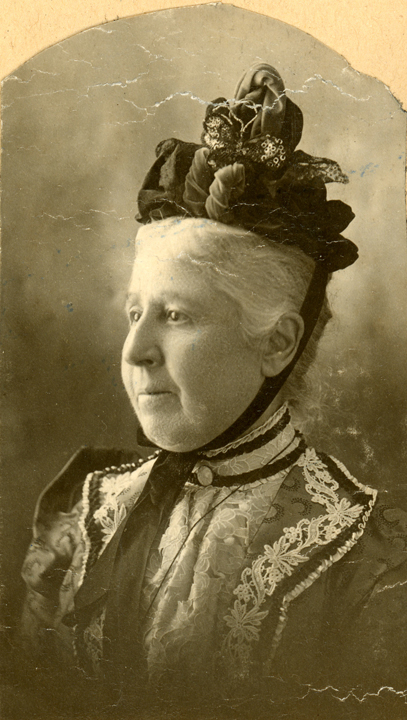
Dorchester Illustration 2588 Emily Fifield
Mrs. Emily A. Fifield was born in Weymouth on Feb. 12,1840. Her father, Thomas B. Porter, was a lumber dealer in the town and had wharfs on the Monatiquot River which passes out into the sea below Quincy.
Emily Porter was was sent into Boston to attend a school kept by William B. Fowle. Coming out of school before her eighteenth birthday, she was betrothed to her life-long boyfriend William Cranch Bond Fifield, who was ten years older, and they were married on May 31 1858. The couple found a house in Dorchester and lived there for 50 years. They had three children Mary; George (died in infancy) and Charles, who died in Dorchester in 1877.
William was a member of the staff of the New City Hospital and was connected to that institution for 18 years. In those days William drove into the hospital over the Avenue by horse carriage. The doctor and the hospital kept a horse always ready to send out to Dorchester when there was an emergency.
Emily was a member of the Boston School Committee from 1884 -1900. (The Massachusetts Constitution allowed only males to vote, but the phrasing of the qualifications for holding elective office did not include that restriction. Women were elected to the school committee in some Massachusetts towns as early as the late 1860s.) The success of the Mechanic Arts School was largely due to her services while she was chairman of the committee. Another achievement was her work in the educational exhibit sent from Boston to the Chicago World’s Fair, the World’s Columbian Exhibition. The exhibit gave Boston the reputation as a leader in educational matters, a reputation that was communicated throughout the civilized world.
She was interested in religious and philanthropic enterprises especially in Dorchester where she lived during the greater part of her more active life.
She was devoted to the Unitarian cause and to her Dorchester church. She dearly loved the national organizations whose meetings she attended faithfully and with eager interest. Mrs. Fifield’s guiding influence was first felt when she became secretary. She helped to form plans that made the society strong and permanent, and she carefully tended to the organization’s growth, always working to include every part of the country. She worked to make her work national in its scope. She felt equally interested in all parts of the country: Pacific Coast, Southern circuit, or Green Harbor. Always a welcome speaker, she used clear and forceful language to communicate a fuller understanding of the aims and methods of the organization.
Emily combined an unusual degree a large vision, the facility of seeing things in their true relations that enabled her to develop plans with rare wisdom and the habit of painstaking attention to minute details. Her reports were models of clarity. Always young in spirit, possessed of open mind, and demonstrating large sympathies while being guided by the highest ideals, she gave her best in generous loving service.
One of Emily’s activities was her work with The Benevolent Society of the First Parish Church. The Society, which was organized in 1861, stated its general purpose in its name. Its definite work is twofold: first, to give deserving women employment in the form of sewing and second to give the garments made by these women and by members of the society to charitable institutions, industrial schools and in response to private appeals.
Sixteen women received sewing assignments through the fall and winter months and nine women through the spring and summer. Each earned $1.50 per month through payment from the Society. The women thus employed were personally known to and visited by the members of the Committee. No one who is not cognizant of the work of the Society can have the slightest idea how valuable to these women was the opportunity of earning money by work which could be done in their own homes and at times when other work was unavailable.
The Society kept both the Dorchester Ward in the New England Hospital and the Nathaniel Hall room at the Mariners’ Home supplied with bed linens, blankets, towels, etc., as required.
